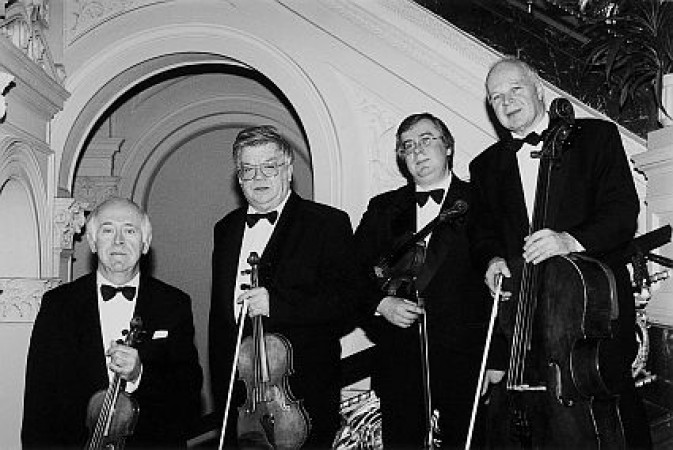
The Bartók String Quartet was founded in 1957 by Péter Komlós (first violin), Sándor Devich (second violin), Géza Németh (viola), and László Mező (cello). At that time, of the four founders of the quartet, three were still students at the Music Academy: Komlós studied there from 1950 to 1956, Devich from 1954 to 1959, Németh from 1954 to 1961, and Mező from 1957 to 1962. The first violinist's teachers were Mrs Bihari, nee Klára Kádár and Ede Zathureczky, the second violinist's Ede Zathurecky and Béla Katona, the viola player's Pál Lukács, and the cellist's Antal Friss. At first the quartet was known as the Komlós String Quartet, but in 1963 it adopted the name, the Bartók String Quartet. In the first years their master was Leo Weiner; after the death in1960 of the great pedagogue of Hungarian chamber music, András Mihály couched them.
Péter Komlós and Géza Németh have been members of the quartet since its founding. László Mező left the ensemble in 1960; his place was taken by Károly Botvay. He played the cello in the Bartók Quartet till 1977, when László Mező returned. There were also changes at the position of second violin: from 1981, when Sándor Devich became a professor at the Music Academy, teaching took first place among his activities, thus a year later he left the quartet. His place was taken by Béla Bánfalvi, who spent three years with the ensemble. His successor is Géza Hargitai, who has been with the Bartók String Quartet ever since. (Botvay studied at the Music Academy between 1950 and 1959, his teachers were Antal Friss and Ede Banda; Béla Bánfalvi received his diploma in 1977, having been József Szász' pupil; Géza Hargitai's professors at the Music Academy were András Kiss, Dénes Kovács and Semion Snitkovsky.)
Following their Hungarian debut (second place in the Budapest International Haydn String Quartet Competition), the ensemble won its first great international success in 1964, winning first place in the Liege International Chamber Music and String Quartet Competition. This was the beginning of their foreign concert tours. The quartet soon became a returning guest at the great international music festivals, appearing in Adelaide, Aldeburgh, Ascona, Aix-en-Provence, Edinburgh, Luzern, Menton, Prague, Spoleto and Venice among other places. They had a rich repertoire from the beginning, and for several decades it has included all the important compositions in the entire quartet literature. A particularly important chapter of their artistic activity is represented by all the string quartets by Beethoven and Bartók, and Brahms' chamber music using strings and piano, his quartets, quintets and sextets. The ensemble made a collection of recordings of the works of these three composers in the Hungaroton studios. The Bartók String Quartet also paid and to this day pays particular attention to contemporary music, and within this, to the task of popularising the contemporary crop of Hungarian string quartets: they gave the original premiers of works by, among others, Attila Bozay, Zsolt Durkó, István Láng, András Mihály, József Soproni and Sándor Szokolay.
The Bartók String Quartet has for decades been in the forefront of international quartet playing. The international specialist publications have written of their concerts and recordings with high appreciation, ranking them among the most important quartets of the second half of the twentieth century. Of the past and present members of the quartet, Sándor Devich was a founding member of the Budapest Festival Orchestra; Károly Botvay, having left the quartet, became the artistic director of the Budapest String Players, and Béla Bánfalvi became the leader of the same ensemble when he also ceased to be a member of the quartet. László Mező and Géza Németh also appeared as soloists. Some of the members of the quartet acted for longer or shorter periods as section leaders or leader in various orchestras, and have taught at the Music Academy. The Bartók String Quartet was awarded the Liszt Prize in 1965, the Kossuth Prize in 1970 and 1997; in 1981 they received the UNESCO Prize and the title, Outstanding Artists, and in 1986 the Béla Bartók-Ditta Pásztory Prize.
K. C.


